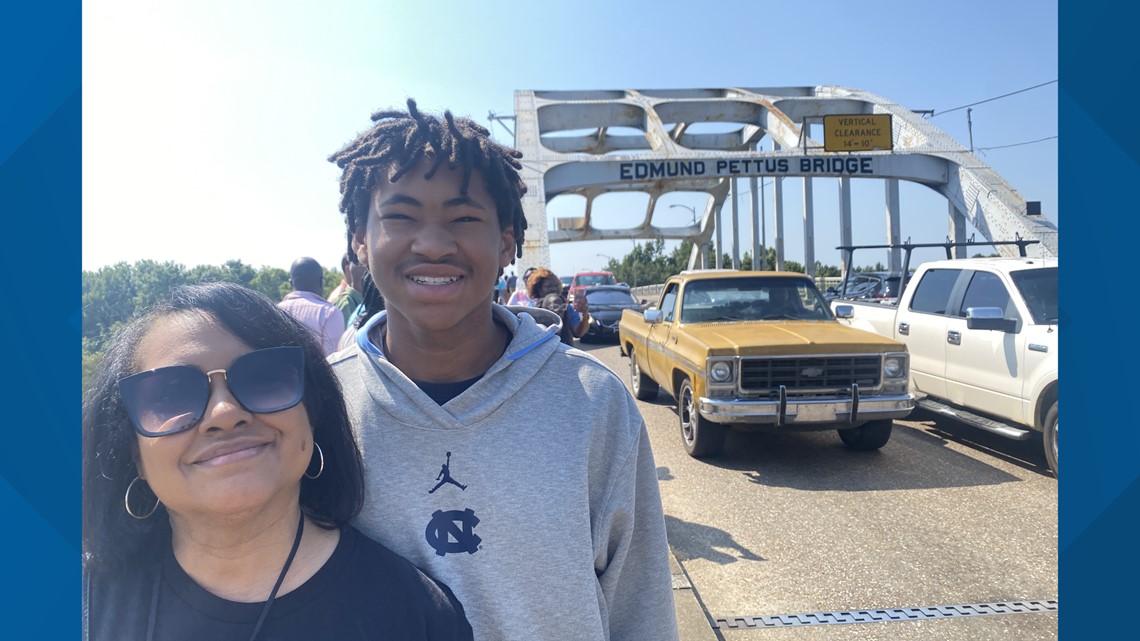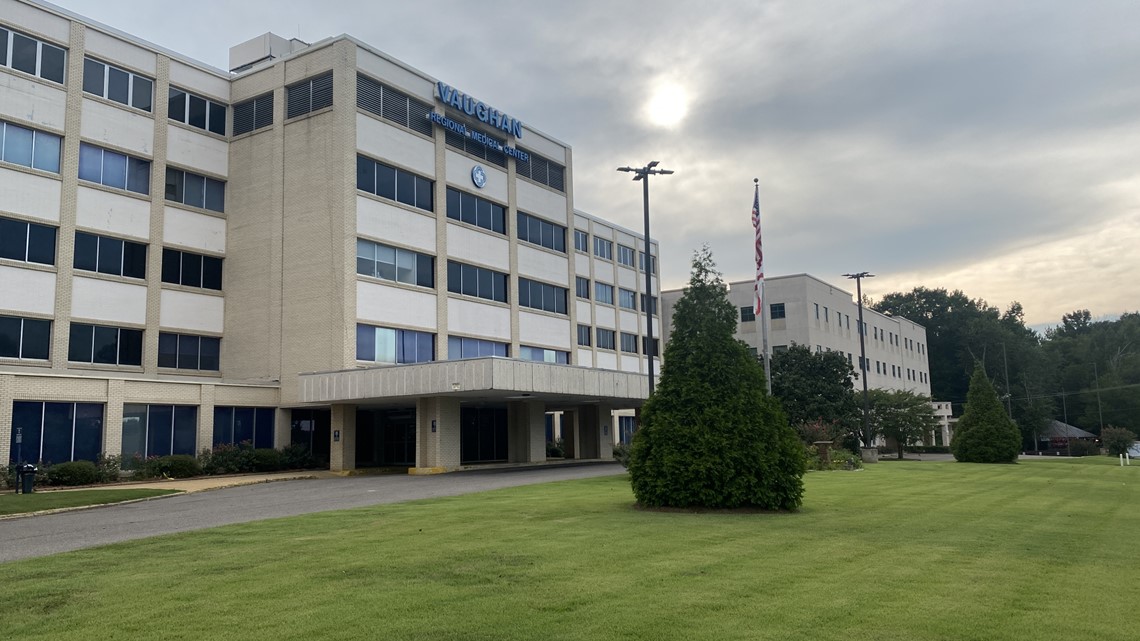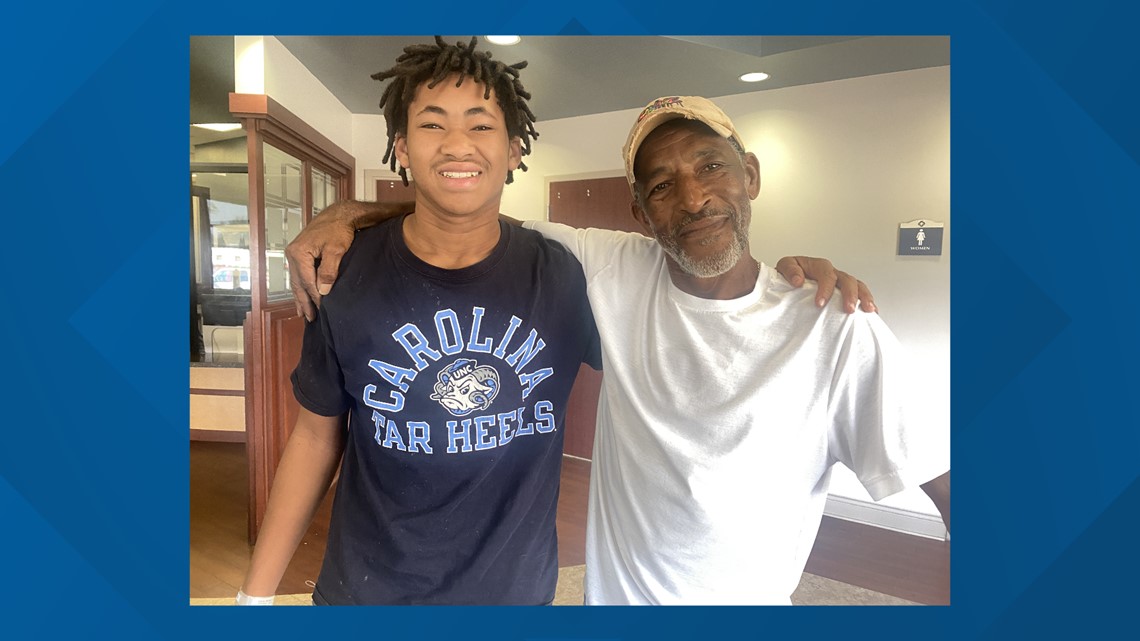NORFOLK, Va. — I like to tell my children, “Kindness changes everything.” And for my family, on Saturday, Aug. 5, kindness did just that and possibly saved my son’s life.
It came in the form of a caring spirit of several people and what had to be a divinely coordinated meeting with a man named Moses.
We were participating in the annual National Association of Black Journalists’ (NABJ) convention in Birmingham, Alabama. 3,000 Black journalists converged in the state known as the birthplace of the civil rights movement. Our gathering in Birmingham represented a symbol of progress in what was once the most segregated city in the nation.
The opportunity to take a bus tour to Selma, 87 miles away, and share that moment with my 17-year-old son, Trevor, was one that I couldn’t pass up.
My husband Harold and brother Ronald were also on the trip, along with dozens of NABJ conventioneers all eager to lay eyes on the exact place where perhaps the most vile and dehumanizing violence of the civil rights movement took place, during what became known as “Bloody Sunday.”
600 peaceful protestors marching for voting rights were brutally attacked by police in March 1965 on a 250-foot-long steel bridge stretching over the Alabama River. That crossing still bears the name of the Confederate icon and Alabama Ku Klux Klan leader for which it was named, Edmund Pettus.


Our stops in Selma were all within a two-mile radius, including the National Voting Rights Museum and the Museum of Enslavement and Civil War.
At one location, several of us went inside the historic Saint James Hotel and picked up a few snacks. There, my son took a bite out of a cinnamon bun. The idea wasn’t to eat the entire thing, as he is a type 1 diabetic. Type 1 means insulin-dependency and the care that goes into blood sugar management is consuming.
Now a mere six months from turning 18, Trevor knows how to handle his health. Before being diagnosed at the age of 8 with Type 1, he was already managing a nut allergy. He had become adept at studying the ingredients of his grub and quizzing food preparers about a dish’s contents, all in close proximity to the eagle eyes of parents who strive to keep him safe. But the silky-smooth icing on that cinnamon bun showed no signs of guilt. Who knew it was made of cashews?
Back on the bus, Trevor began to feel discomfort. His tongue tingled, his stomach a little queasy. I eyed a grocery store as we neared the next stop with a plan to go there to get Benadryl. Once we stopped at Selma University, my husband ran to find the store.
I stayed behind and worked collectively with a group of NABJ ladies I came to know as angels. They gave up their lunch and part of the tour demonstrating that warm NABJ spirit to help my son. Trevor had begun to scratch hives that were breaking out all over his skin. My concern was his breathing, which remained calm — airwaves open, his blood sugar in the safe range. He was talking and said he felt okay except for a growing itch. We used wet paper towels to cool skin and gave him water.
There was NABJ member Tania Francois, who called area urgent care centers looking for a place for Trevor to get checked out. They were all closed. Monica Kirkland and Melanie Burney stood by assisting with trying to keep Trevor comfortable. And there was Sabrina Wilson, who revealed allergies once brought her close to death as she held a small battery-operated fan over Trevor while he lay flat on the floor wearing only a pair of shorts. Bothered by the metastasizing hives, he had stripped down, even taking off his socks and shoes.
A man named Moses
My husband returned quickly with Benadryl. He had started on his way when he spotted a man sitting in a pickup truck under a tree reading Bible scriptures. He asked the man for directions to the store and then pressed him for a ride. “I don’t know you!” the man told Harold.
“I’m not trying to rob you. My son is experiencing a medical emergency,” Harold explained.
That’s all it took for 61-year-old Moses Thomas to leap into action. Using a wrench as a shift to start his truck, he rushed Harold to the store and back to the tour bus.
By that time, Trevor was very uncomfortable, and we decided to take him to the hospital. There were no Uber drivers around and we didn't want to wait on an ambulance we were unsure would even come. Moses and his concern for a young man he'd never met were still there.
When a lethargic Trevor informed us that he felt like he couldn't walk, Francois, with the strength of an NFL linebacker, insisted he get on her back, with Harold holding Trevor's legs. Moses grabbed him from Francois and loaded him in the pick-up as Harold and I hurdled into the truck bed. We sped through town. That's when I was most nervous, not from the potential danger of the rapid ride, but I couldn't see Trevor from the back of the truck. I worried he was getting worse. Later, I found out that periodically, Moses tapped him on the leg encouraging him, "You, okay?" "Stay with me." "Hang in there."
We got Trevor into the emergency department at Vaughn Regional Medical Center. Nurses hooked him up to an IV to give him more Benadryl. A chest X-ray, blood pressure, temperature, and blood sugar levels were all good.
NABJ board member Eva Coleman diligently kept in touch with me on Trevor's progress. It became clear that Trevor wouldn't be released from the hospital in time for the tour bus's departure to Birmingham. So, Moses drove Harold to the bus so he and Ronald could ride with the group and return with Ronald’s rental car. To show their gratitude for Moses, Coleman, along with fellow NABJ members, took up a collection for him.


Kindness changes everything
Waiting in the hospital with Trevor gave me the opportunity to see Selma as more than a town synonymous with racial strife.
Earlier, the bus tour provided glimpses of areas suffering severe storm damage and parts that looked as if time was standing still. Selma, nicknamed the Queen City of the Black Belt, has a population of about 17,000 people. 84% of the residents are Black or African American, according to the U.S. Census, and the poverty rate is 29.4%, more than double the national average.
The hospital staff was friendly. I am grateful for the security guards who rushed to Trevor's aid after he collapsed onto the floor face down in a regurgitating fit. One even tried to figure out a way for us to get back to Birmingham to prevent Harold from having to make the two-hour trip back. Other patients and their relatives all asked me if Trevor was alright and wished him well.
As we sat in the waiting room, Moses came back.
"I just wanted to check on you," he said.
A thin man who walks with a cane, Moses is a retired welder. He spoke about his devout trust in God. Religion, he says, is how he will live long enough to watch his young grandchildren grow into adulthood. Still not done with his extensions of generosity, Moses insisted on getting Trevor and me chicken from Zaxby's as we waited.
And before we said goodbye, Moses handed me an original copy of an article from the March 8, 1965 edition of the Selma Times-Journal.
The words and pictures in black and white reminded me of our original purpose of the trip: to take in the horrors of that day at the Edmund Pettus Bridge. It was sobering indeed. But in an unexpected twist, my family walked away feeling embraced by mercy and grace.


I like to tell my kids, “Kindness changes everything,” and ironically, in a place etched in history for heartless behavior, kindness did change everything.
Thank you, NABJ.
Thank you, Selma.
And a special thanks to a man named, Moses.


